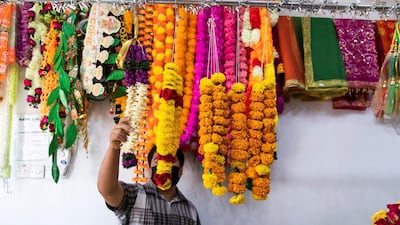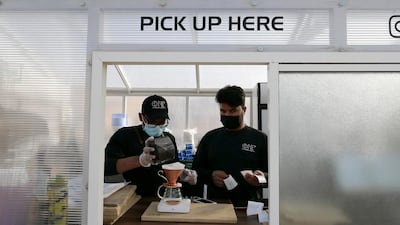Health authorities warned that complacency amid successful vaccination campaigns and falling daily case numbers could put the UAE's recovery from Covid-19 at risk.
Dr Shereena Al Mazrouei, health promotion manager at Abu Dhabi Public Health Centre, said some people were flouting rules and meeting in large groups.
She told The National it had been a challenge to convince families during Ramadan to stop.
Since the start of Ramadan Abu Dhabi Police broke up 39 illegal gatherings, but many more were believed to have gone unreported.
Dr Al Mazrouei said the UAE was at a crucial moment in the battle against coronavirus and everyone needed to continue to distance, wear masks and sanitise.
She said some people were letting their guard down because of the country's vaccination drive, but Ramadan and next week's Eid Al Fitr holiday was no time for complacency.
"Ramadan and Eid are very critical times and we have noticed that people are becoming even more lax because of vaccinations," said Dr Al Mazrouei.
"We are definitely looking forward to 100 per cent vaccination. But those who are vaccinated should still not go out to Ramadan and suhoor gatherings and spread the infection.”
Mass testing and one of the world's fastest vaccination drives have seen cases reduce from close to 4,000 a day in January to less than 1,800 over the past few days. But because someone has been vaccinated it doesn't mean they are totally protected, Dr Al Mazrouei said.
"Yes, they have a better chance, but they should continue to follow precautionary measures until the pandemic is over," she said.
"People are aware now that there are asymptomatic cases, so even if their Covid-19 results are initially negative and they are not experiencing symptoms, they should remain taking every precaution.
"As a precaution, even followed in my family, parents and grandparents are greeted at a distance. We avoid kissing and hugging, even though we all wish to do so, but this is for their protection."
As per the UAE’s rules during Ramadan, only immediate family members living in the same house can share iftar, which breaks the fast, and suhoor, eaten before the day begins.
But these cherished Ramadan moments are particularly challenging months for authorities.
"[The] numbers of unnecessary gatherings during Ramadan and people going to work and returning back home to spread the infection are increasing," Dr Al Mazrouei said.
"We need to be careful. We need to reduce outings and keep our distance from elderly and high-risk people.
“Those who are attending work physically should keep their distance. Those who are working online can remain in the same bubble.”
Residents are also advised to remain in "bubbles" where possible and work from home. This makes it easier to locate and isolate specific groups when an infection is reported.
A bubble typically means just the members of your household. If someone needs to go to work, they should keep their distance at home.
"I know that families are extended where there are the parents, grandparents, children, aunts and uncles, and they all want to mingle, but this poses a risk because many of the members of the family still go to work and those that go to work are a risk to their families," said Al Mazrouei.
The UAE has administered about 10.6 million vaccine doses in just a few months, which represents 107.28 doses per 100 people.
But she emphasised the importance of preventative measures.
“Unfortunately, with the pandemic well into its second year, it is highly important that people practise precautionary measures of wearing face masks, sanitising hands and socially distancing," she said.
"Family gatherings are a tradition, but with the pandemic we need to protect ourselves and those close to us, particularly the elderly and those which chronic conditions that fall under high-risk groups.”



































